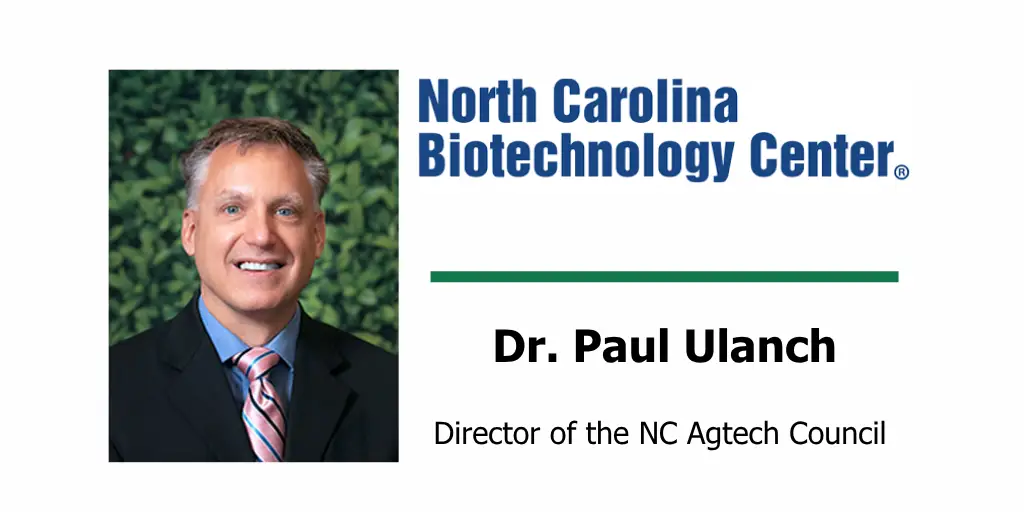Recently, Golden LEAF President, Chief Executive Officer Scott T. Hamilton sat down with Dr. Paul Ulanch, Director of the NC Agtech Council, via Zoom and filmed an episode of Critical Conversations. In this series, Scott talks with professionals about economic development issues affecting the state.
The North Carolina Agtech Council, organized by NCBiotech, is a group of North Carolina leaders, stakeholders, and partners focused on addressing opportunities, challenges, and gaps in agricultural technology development and economic development for the ag tech sector statewide.
Dr. Ulanch joined the Biotechnology Center’s Agriculture Sector Development unit in October of 2011, developing resources to aid in the growth of ag biotech companies. He was promoted to lead the Crop Commercialization Program in February 2013. In that role he pursues value-add opportunities to improve crops that result in increased profits for North Carolina growers and strengthens the state’s agribusinesses.
Dr. Ulanch shared that the Agtech Advisory Council’s origins date back to 2010, when the North Carolina Biotechnology Center created a team focused on agtech sector development. He added that a key part of this work was creating an advisory group of leading stakeholders from across the state, including agribusiness, the broader agricultural sector, and the agtech industry. Initially, Dr. Ulanch said, the Agtech Advisory Council functioned primarily as an advisory body to the Biotech Center, helping guide early efforts to grow the agtech ecosystem. Over time, it evolved into a true collaborative network of partners working together to elevate North Carolina’s leadership in agtech.
North Carolina’s agtech sector is one of the largest globally, with more than 185 companies ranging from major corporations to mid-size firms and startups, added Dr. Ulanch. These companies are located throughout the state. Council members are selected based on their ability to provide value and their willingness to actively engage. Members include large and small agtech companies, as well as investors, university representatives, and key industry leaders.
Academic partners include the state’s land-grant universities and have representation from NC State’s College of Agriculture and Life Sciences, N.C. A&T State University’s College of Agriculture and Environmental Sciences, and the Plant Science Initiative at NC State, shared Dr. Ulanch. He added that BASF Center for Sustainable Protein, the North Carolina Department of Agriculture and Consumer Services, NC Farm Bureau, and various commodity groups are also involved. The Biotech Center serves as the coordinating backbone, helping facilitate statewide ecosystem development, said Dr. Ulanch.
The shared goal of the Agtech Advisory Council is to strengthen and grow the agtech ecosystem through a North Carolina agriculture lens, identifying challenges we can address together, more quickly and effectively, explained Dr. Ulanch. He shared some of the projects the Agtech Advisory Council has worked on. The AgTech Accelerator Program evaluates accelerator models to determine the best fit for North Carolina’s unique agtech landscape. They have also created a consistent brand, ensuring all partners leverage the “Research Triangle AgTech Cluster” brand developed by the Research Triangle Regional Partnership for cohesive marketing. The council has supported specialized training for workforce development programs like NC State’s CERSA, which educates students on regulatory science in crop and animal health, and a new initiative with East Carolina University focused on formulation science, a critical but undertrained field in agtech.
The Agtech Council and Biotech Center view the Agtech sector broadly to include plant and animal science innovation, food processing, and data science applications, shared Dr. Ulanch. He said, NC State is internationally recognized in advancing gene editing for specialty crops in the region. There is also a shift from synthetic chemicals to biological solutions for crop protection and yield enhancement. He added that tools like GPS and remote sensing have been around for a decade, and the next wave, powered by generative AI, is making these technologies accessible to small and specialty crop farms across North Carolina.
Dr. Ulanch is one of the working group leaders for the NC Ag Leads initiative. He said that one major insight was the disconnect many farmers feel from agtech, which prompted a key focus on improving access to technology. Dr. Ulanch added that the working group landed on four main ideas to focus on: a farmer-engaged accelerator program, modernized research farms focused on high-tech hubs for demonstrating agtech innovations, enhanced extension agent engagement as tech liaisons that connects emerging ag technologies with local farmers and their specific challenges, and focused agtech innovation funding.
To learn more about the North Carolina Agtech Advisory Council, visit https://www.ncbiotech.org/AgTechCouncil.

